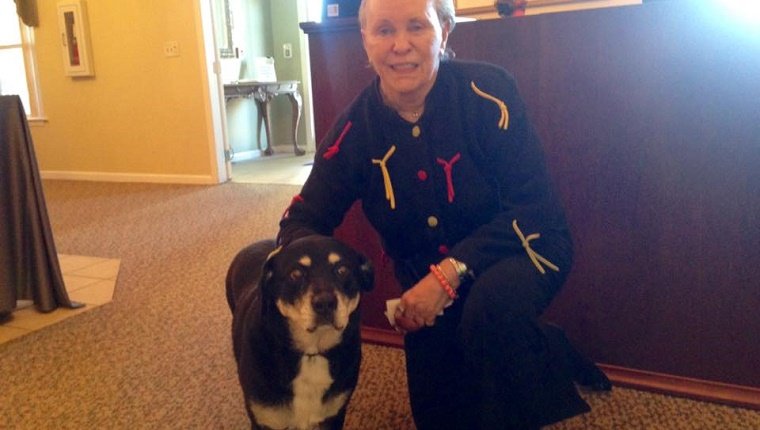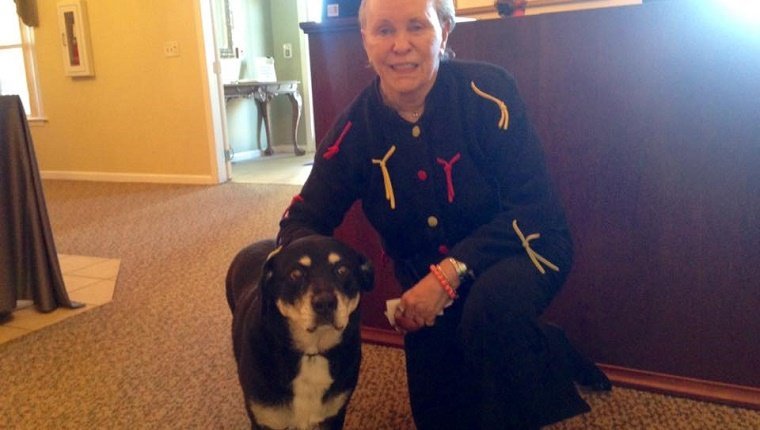A senior home in Austin, Texas, decided to adopt an old dog after her resident owner passed away. The dog, named Izzy, quickly won the hearts of both residents and staff, leading the home to make the compassionate decision to give her a forever home.
Izzy’s presence brings comfort and companionship to the senior home, helping to fill the void left by her owner’s passing. This heartwarming story highlights the importance of providing love and care to animals in need, especially in the aftermath of a loss.
The senior home’s decision to adopt Izzy showcases the positive impact that pets can have on the lives of seniors, fostering a sense of joy and connection within the community.
The Impact Of Losing An Owner On A Dog
After her resident owner passed away, Izzy, an old dog, was adopted by the senior home where she had won the hearts of both residents and staff. The impact of losing an owner on a dog can be heartbreaking, with behavioral changes and signs of grief similar to humans.
Grieving And Behavior Changes
When a dog loses their beloved owner, they experience a deep sense of grief and their behavior undergoes significant changes. Just like humans, dogs mourn the loss of their companions and struggle to cope with the sudden absence.
Dogs may become depressed and listless, showing little interest in their surroundings. They may exhibit a decreased appetite and withdraw from activities they once enjoyed, such as playing.
This grieving process is a natural response to the loss, and it is important for caretakers to understand these behavior changes and provide support during this difficult time.
Emotional Recovery
With time and proper care, dogs can go through an emotional recovery process after losing their owner. It’s crucial to offer them love, patience, and reassurance during this period of mourning.
Creating a sense of routine and stability can help dogs regain their emotional balance. Maintaining consistent feeding and exercise schedules, along with engaging in positive reinforcement training, can provide a sense of security and comfort.
In addition, allowing the dog to form new bonds and connections can aid in their healing process. This can be achieved by providing opportunities for socialization with other animals and humans, such as visits to dog parks or participating in obedience classes.
:max_bytes(150000):strip_icc():focal(749x0:751x2)/shelter-dog-paintings-091523-2-8f30e68dd5e84f718b9642c9df2e2fab.jpg)
Credit: people.com
Options For Rehoming A Dog
In the unfortunate event of a dog owner’s passing, there may be a need to find a new home for the beloved pet. Several options are available for rehoming a dog responsibly and ensuring they find a loving environment where they can continue to thrive.
Seeking Help From Shelters And Rescue Groups
One of the most reliable and effective options for rehoming a dog is to seek help from local shelters and rescue groups. These organizations have the necessary experience and resources to find suitable homes for pets in need.
Here are some steps to take when considering this option:
- Contact local shelters and rescue groups: Research and reach out to organizations that specialize in the type or breed of dog you need to rehome.
- Provide detailed information: When contacting these organizations, be ready to provide important details about the dog, including their age, breed, temperament, and any special needs or considerations.
- Arrange for a meeting: Shelters and rescue groups may want to meet the dog and assess their behavior before accepting them into their program.
- Complete necessary paperwork: If the shelter or rescue group agrees to rehome the dog, they will likely require you to fill out specific forms and provide medical records.
Considerations For Rehoming A Dog
It’s important to remember that rehoming a dog is a serious decision that should prioritizes the dog’s well-being. Before making a final choice, consider the following:
- Family and friends: Reach out to trusted family members or friends who may be interested in providing a loving home for the dog.
- Online platforms: Utilize reputable online platforms that connect prospective adopters with pets in need of rehoming.
- Pre-screen potential adopters: When considering individuals or families as potential adopters, conduct interviews and ask for references to ensure they are capable of providing the care the dog requires.
- Temporary foster care: Consider options for temporary foster care, where a responsible caretaker can provide a stable environment for the dog while you search for a permanent home.
Remember, the ultimate goal is to find a safe and loving home for the dog, where they will be cared for and cherished. By exploring these options, you can ensure the best outcome for the dog’s future.
Handling The Death Of A Dog
When the owner of a senior home in Austin, Texas passed away, the home decided to adopt her old dog, Izzy. Izzy quickly became loved by the residents and staff of the home, providing comfort and companionship during this difficult time.
Storing The Body At The Vet’s Office
When a beloved dog passes away, it can be an emotional and challenging time for the owner. One of the first steps in handling the death of a dog is to determine what to do with their body. In some cases, the vet’s office may offer the option of storing the dog’s body for a day or two. This allows the owner time to make decisions about aftercare arrangements, such as cremation or burial.
Arranging Cremation Or Burial
After the body is stored at the vet’s office, the next step is to arrange for the dog’s final farewell. There are two common options when it comes to aftercare – cremation or burial. Cremation involves the process of reducing the dog’s body to ashes, while burial involves laying the body to rest in a chosen location.
Arranging cremation or burial can be a personal decision based on the owner’s preferences and beliefs. It’s important to consider factors such as cost, environmental impact, and sentimental value when making this decision. Some owners may choose to keep the ashes in an urn or scatter them in a meaningful location, while others may opt for a burial in a pet cemetery or their own backyard.
Whichever option is chosen, it’s crucial to find a reputable company or service to handle the aftercare arrangements. The vet’s office should be able to provide recommendations or connect the owner with a local company specializing in pet cremation or burial.
Handling the death of a dog is never easy, but by taking these steps and making thoughtful decisions, owners can ensure that their beloved companion is given a proper farewell and that their memory lives on.

Credit: dogtime.com
Heartwarming Stories Of Senior Dogs Finding New Homes
Austin, Texas’s senior home showed immense compassion by adopting an old dog named Izzy after her owner’s passing, bringing warmth and joy to both the residents and staff.
Senior Dog Adopted By Senior Home
One of the most heartwarming stories of senior dogs finding new homes comes from a senior living facility in Austin, Texas. After the passing of one of their beloved residents, the senior home decided to adopt the resident’s old dog, Izzy. This act of kindness not only provided Izzy with a loving home but also brought joy and companionship to the residents and staff of the senior home.
Adoption Stories After An Owner’s Death
Losing a pet can be a devastating experience, especially for senior dog owners who may have formed a deep bond with their furry companions over the years. In some cases, when a senior dog owner passes away, their loyal pets are left without a home and facing an uncertain future. However, there are heartwarming stories like Izzy’s that prove that even in the face of tragedy, there is hope for senior dogs to find new homes and continue to bring love and happiness to those around them.
Senior homes are often filled with individuals who appreciate the companionship and unconditional love that dogs can provide. Adopting a senior dog in need not only benefits the dog but also provides companionship and a sense of purpose to the residents. It creates a win-win situation where both the dog and the seniors can enjoy their golden years together.
Senior dogs, just like their human counterparts, deserve a comfortable and loving home where they can spend their remaining years. Their age should never be a hindrance to finding a new home filled with love and care. These heartwarming adoption stories after an owner’s death serve as a reminder that senior dogs have so much love to give, and they deserve a chance to be cherished and valued.
The bond between humans and dogs is truly special, and it doesn’t diminish with age. In fact, senior dogs often have a wisdom and gentleness that can bring immense comfort to those who are in their golden years. By adopting senior dogs, senior homes can create a beautiful and fulfilling environment for both the residents and the dogs.
It is heartening to see senior homes like Austin’s adopting senior dogs and creating a harmonious and loving community. These heartwarming stories inspire us to consider adopting senior dogs ourselves, giving them a second chance at a fulfilling life and the love they truly deserve.

Credit: www.usatoday.com
Frequently Asked Questions Of A Senior Home Adopts An Old Dog After Her Resident Owner Passes Away
What Do Dogs Do When Their Owner Dies?
When their owner dies, dogs grieve and their behavior changes. They may become depressed, lose their appetite, and refuse to play. Dogs miss their owners and need time to heal emotionally from the loss. Recovery time varies.
Do Dogs Miss Their Previous Owners?
Dogs do miss their previous owners and need time to heal from the emotional loss. They may become depressed, lose their appetite, and show a decline in playfulness. However, the grieving process varies from dog to dog, and with time, most dogs can recover emotionally.
What To Do If You Don’t Want Your Dog Anymore?
If you don’t want your dog anymore, seek help from shelters and rescue groups. They can assist in finding your pet a new home through programs or listings on their website. Local agencies may have additional resources to help with rehoming your dog.
What Happens When A Dog Dies?
When a dog dies, their owner can make arrangements for aftercare such as cremation or burial. The vet’s office can assist in storing the body temporarily and connecting with a local company for cremation or burial.
Conclusion
In a heartwarming turn of events, Izzy, an old dog, found a new home at a senior living facility after her owner passed away. The residents and staff quickly fell in love with Izzy, prompting the decision to adopt her.
This story highlights the profound bond between humans and animals and the positive impact pets can have on the lives of seniors. It is a beautiful reminder that love and companionship know no bounds, transcending age and circumstance.

